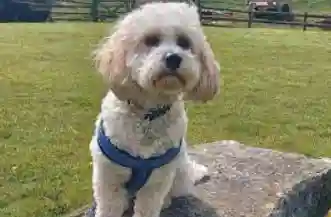Hey there! In this article, we will look into the best small mixed-breed dogs. In the vast world of dogs, small crossbreeds hold a special place. They combine the best of two breeds, resulting in unique and lovable companions. If you’re considering adding a furry friend to your family, you’ll want to explore the world of the best small crossbreed dogs. In this guide, we’ll delve into these delightful canines, covering their characteristics, care requirements, and much more.
What are the best small crossbreed dogs?
Small crossbreed dogs, also known as designer dogs, are the result of breeding two distinct purebred dogs. This deliberate crossbreeding aims to combine the favorable traits of both breeds while minimizing their inherent health issues. These dogs typically have charmingly unpredictable appearances and personalities, making them beloved by dog enthusiasts.
The Popularity of Best Small Crossbreed Dogs
Small crossbreed dogs have gained immense popularity in recent years due to their adaptability and unique qualities. Here’s why they’re so sought-after:
- Size Matters: Small crossbreeds are perfect for people living in apartments or smaller homes. Their compact size makes them easier to accommodate.
- Temperament: Their mixed heritage often results in well-balanced temperaments, combining the energy of one breed with the gentleness of another.
- Unique Looks: Small crossbreed dogs often have distinctive appearances that set them apart from purebreds.
- Health Benefits: Crossbreeding can reduce the risk of hereditary health problems that affect purebred dogs.
Characteristics of Small Crossbreed Dogs
Each small crossbreed dog is a unique blend of its parent breeds, but there are some common characteristics to look out for:
| Characteristic | Description |
|---|---|
| Size | Typically small to medium-sized. |
| Coat | Varied, depending on the parent breeds. |
| Temperament | Friendly, adaptable, and affectionate. |
| Energy Level | Varies but often moderate. |
| Trainability | Intelligent and eager to please. |
| Lifespan | Generally longer than purebred dogs. |
The Most Popular Small Crossbreed Dogs
Let’s explore some of the most beloved small crossbreed dogs:
1. Puggle

Among the most popular small mixed-breed dogs, the Puggle stands out as a lovable and distinctive choice. This charming crossbreed combines the Pug’s endearing wrinkles and the Beagle’s friendly disposition, creating a delightful companion known for its sociable nature and adaptability. With its moderate energy level and intelligence, the Puggle easily integrates into various lifestyles, making it a beloved member of countless families and households across the world. Whether you’re seeking an affectionate playmate or a loyal friend, the Puggle’s unique blend of traits ensures it remains a favorite among small crossbreed dog enthusiasts.
2. Cockapoo

The Cockapoo, a cherished small mixed-breed, stands out as a remarkable blend of the Cocker Spaniel and Poodle breeds. This beautiful canine displays the best of both worlds with its intelligence and friendly disposition. What makes the Cockapoo particularly appealing to many is its low-shedding coat, making it an ideal choice for families with allergies. Their appearance varies in color and texture, adding to their charm. Cockapoos are known for their playful and affectionate nature, making them excellent companions for individuals and families alike. Whether you seek a loyal, intelligent friend or a low-maintenance pet, the Cockapoo’s unique mix of qualities cements its place among the most beloved small crossbreed dogs.
3. Maltipoo

The Maltipoo, a darling small mixed-breed, is the result of mixing the Maltese and Poodle breeds. These tiny, fluffy companions are adored for their affectionate and lively personalities. Maltipoos often have a soft, curly coat that comes in various colors, making them a visual delight. What sets them apart is their unwavering devotion to their owners. These dogs are known for their sweet and loving nature, making them perfect for families and individuals seeking a constant source of joy and companionship. Whether you’re looking for a cuddly lap dog or an energetic playmate, the Maltipoo’s endearing qualities make them a cherished member of the small crossbreed dog family.
4. Shih-Poo

The Shih-Poo, a delightful small mixed-breed, is the outcome of combining the Shih Tzu and Poodle breeds. These charming canines are cherished for their affectionate and amiable nature. Shih-Poos often feature a coat that is soft and wavy, and they come in various colors, showcasing their endearing appearance. What truly sets them apart is their ability to form strong bonds with their families. Shih-Poos are known for their loyalty and gentle disposition, making them excellent companions, especially for families seeking an affectionate and adaptable furry friend. Whether you’re in search of a loyal, easygoing pet or a loving addition to your household, the Shih-Poo’s charming characteristics ensure they remain among the most beloved small crossbreed dogs.
5. Cavachon

The Cavachon, a small mixed-breed dog, is the delightful result of blending the Cavalier King Charles Spaniel and Bichon Frise breeds. These cheerful canines are known for their adaptability and affectionate nature. Cavachons typically feature a soft, fluffy coat and expressive eyes, which contribute to their charming appearance. What makes them particularly appealing is their ability to fit seamlessly into various lifestyles. Cavachons are renowned for their friendly disposition, making them wonderful companions for individuals and families alike. Whether you’re seeking a joyful and adaptable pet or a cuddly addition to your household, the Cavachon’s unique blend of traits ensures they hold a special place among the most beloved small crossbreed dogs.
Caring for Small Crossbreed Dogs
To ensure the well-being of your small crossbreed companion, follow these care guidelines:
Nutrition: A Vital Component of Caring for Small Crossbreed Dogs
Proper nutrition plays a pivotal role in the overall well-being and longevity of your small crossbreed dog. These delightful companions have unique dietary needs, and ensuring they receive the right nutrients is a vital aspect of responsible pet care. Let’s delve deeper into how nutrition is the cornerstone of caring for your small crossbreed dog.
Tailoring Their Diet: Small crossbreed dogs, like all canines, require a diet that suits their specific life stage, size, and activity level. Selecting the right dog food is paramount. Choose high-quality dog food brands that offer formulas tailored to small breeds. For puppies, opt for puppy food to support their rapid growth, while adult dogs benefit from maintenance or all-life stage formulas that meet their nutritional requirements.
The Importance of Protein: Protein is the building block of your dog’s body. It’s responsible for repairing and maintaining tissues, making it a fundamental nutrient. Ensure that the dog food you choose contains a healthy balance of protein, carbohydrates, and fats. Look for protein sources such as chicken, beef, or fish, and make sure the food is enriched with essential vitamins and minerals.
Portion Control Matters: Small crossbreed dogs are susceptible to weight gain, which can lead to a host of health issues. To prevent this, practice portion control. Follow the feeding guidelines provided on the dog food packaging, but remember to adjust portions based on your dog’s age, activity level, and individual metabolism. Avoid overfeeding, as excess weight can strain their joints and increase the risk of obesity-related conditions.
Hydration Is Key: In addition to proper nutrition, hydration is equally essential. Always ensure your small crossbreed dog has access to fresh, clean water. Small dogs can be prone to urinary issues, and staying well-hydrated helps mitigate this risk.
Regular Vet Consultations: Lastly, remember that the dietary needs of your small crossbreed dog may change as it ages. Regular check-ups with your veterinarian are important. Your vet can assess their overall health and provide dietary recommendations tailored to their specific needs, ensuring they receive the best possible care throughout their life.
Exercise: Keeping Your Small Crossbreed Dog Fit and Happy
Exercise is an integral part of caring for your small crossbreed dog, contributing significantly to their physical and mental well-being. While these petite pups may not require as much exercise as larger breeds, ensuring they stay active is essential to their overall health and happiness. Let’s explore the importance of exercise in caring for your small crossbreed dog.
Tailoring Exercise to Their Needs: Small crossbreed dogs have varying energy levels based on their parent breeds. Understanding your dog’s unique requirements is key to providing them with the right amount of exercise. Some small crossbreeds are more energetic and may enjoy longer play sessions, while others are content with shorter bursts of activity.
Daily Walks: Daily walks are a fundamental aspect of exercise for small crossbreed dogs. Aim for at least one brisk walk each day to help them expend energy and maintain a healthy weight. Keep the walks interesting by exploring different routes, parks, or trails to stimulate their senses and prevent boredom.
Interactive Playtime: Interactive play is essential for mental stimulation and bonding with your small crossbreed dog. Engage in games like fetch, tug-of-war, or puzzle toys that challenge their problem-solving skills. These activities not only provide physical exercise but also keep their minds sharp and active.
Socialization: Small crossbreeds, like all dogs, benefit from socialization. Encourage positive interactions with other dogs and people to prevent behavioral issues and ensure they grow up to be well-adjusted pets. Consider arranging playdates or enrolling them in puppy socialization classes to expose them to various experiences.
Indoor Activities: When outdoor exercise is limited, especially during inclement weather, indoor activities can help your small crossbreed dog stay active. Set up obstacle courses, use treat-dispensing toys, or engage in indoor games to keep their bodies and minds engaged.
Senior Care: As your small crossbreed dog ages, their exercise needs may change. Senior dogs may require gentler activities and shorter walks, but it’s crucial to keep them moving to maintain their joint health and prevent obesity.
Consult with a Veterinarian: Always consult with your veterinarian to determine the appropriate exercise regimen for your small crossbreed dog. They can provide guidance based on your dog’s age, health status, and individual needs.
Grooming: Keeping Your Small Crossbreed Dog Healthy and Well-Groomed
Proper grooming is a vital aspect of caring for your small crossbreed dog, ensuring they not only look their best but also maintain good health and overall well-being. These adorable companions may have different coat types and grooming needs, but every small crossbreed deserves regular attention to keep them comfortable and happy. Let’s delve into the importance of grooming in caring for your small crossbreed dog.
Coat Type Matters
Small crossbreed dogs can have a wide range of coat types, from short and smooth to long and curly. Understanding your dog’s specific coat type is crucial in determining their grooming requirements. Here’s a breakdown of common coat types and their needs:
- Short Coat: Dogs with short coats, like Puggles, require less frequent brushing but benefit from occasional grooming to remove loose hair and dirt.
- Long Coat: Breeds such as the Shih-Poo may have longer, flowing coats. Regular brushing is essential to prevent matting and tangling. Consider professional grooming for intricate hairstyles.
- Curly Coat: Dogs with curly coats, like Maltipoos, often require frequent brushing to prevent matting. Regular trimming may also be necessary to maintain their coat’s appearance.
Regular Brushing: Regardless of the coat type, all small crossbreed dogs benefit from regular brushing. This not only keeps their fur looking pristine but also helps distribute natural oils, keeping the coat healthy and reducing shedding. Aim for brushing sessions at least a few times a week, or more often for long-haired breeds.
Bathing: Bathing should be done as needed, typically every 4-8 weeks, depending on your dog’s activity level and coat condition. Use a mild, dog-specific shampoo to avoid skin irritation. Be sure to rinse thoroughly to remove all soap residue.
Nail Care: Trimming your dog’s nails is essential to prevent overgrowth, which can lead to discomfort and difficulty walking. If you’re unsure about how to trim nails safely, consult a professional groomer or veterinarian.
Dental Hygiene: Oral health is often overlooked but is crucial for your dog’s well-being. Brush your small crossbreed’s teeth regularly to prevent dental issues and maintain fresh breath. Use a dog-specific toothbrush and toothpaste.
Ear Cleaning: Check your dog’s ears regularly for signs of infection, wax buildup, or debris. Clean their ears as needed, using a dog-specific ear cleaner and a soft cloth or cotton ball. Be gentle to avoid injury.
Professional Grooming:
Consider professional grooming for complex hairstyles or if you’re unsure about handling certain grooming tasks. Professional groomers have the expertise and tools to keep your dog looking and feeling their best.

Training and Socialization: Nurturing Well-Behaved Small Crossbreed Dogs
Effective training and socialization are integral components of caring for your small crossbreed dog, contributing significantly to their development and well-being. These adorable companions thrive when provided with guidance and exposure to various experiences. Let’s explore the importance of training and socialization in nurturing well-behaved small crossbreed dogs.
Early Training Matters: Early training is crucial for small crossbreed dogs, as it sets the foundation for their behavior and social interactions. Begin basic obedience training as soon as you bring your puppy home. Use positive reinforcement techniques such as treats, praise, and gentle corrections to encourage desired behaviors.
Consistency and Patience: Consistency is key to successful training. Establish clear rules and routines, and stick to them. Be patient and understanding, as small crossbreeds may be sensitive to harsh training methods. Positive reinforcement, where you reward good behavior, is highly effective.
Socialization Benefits: Socializing your small crossbreed dog from a young age is essential. Exposure to various people, animals, environments, and situations helps prevent fearfulness and aggression, ensuring your dog becomes a well-adjusted and confident adult.
Puppy Classes: Enroll your puppy in puppy socialization classes. These classes provide a structured environment where your dog can interact with other puppies and learn valuable social skills. They also offer guidance for addressing common puppy behaviors.
Leash Training: Small crossbreeds can be prone to pulling on the leash. Leash training is essential to ensure safe and pleasant walks. Use positive reinforcement to reward loose-leash walking and avoid harsh corrections.
Recall Training: Teaching your dog to come when called is a crucial safety skill. Start in a controlled environment and gradually progress to more distracting situations. Always reward your dog generously for returning to you.
Behavior Management: Address any behavioral issues promptly. If your dog displays unwanted behaviors like barking excessively or aggression, consult a professional dog trainer or behaviorist for guidance.
Social Interaction: Encourage positive interactions with other dogs and people. Arrange playdates with other well-behaved dogs and expose your dog to various individuals, including children and strangers, to build their confidence.
Respect Individual Personality: Remember that each small crossbreed dog has a unique personality. While training and socialization are essential, respect your dog’s individuality and adapt your approach to their specific needs and temperament.
Lifelong Learning: Training and socialization should be ongoing processes throughout your dog’s life. Continue to reinforce good behavior and provide opportunities for social interactions.
Health Care: Ensuring the Well-Being of Your Small Crossbreed Dog
Proper health care is paramount when it comes to caring for your small crossbreed dog, ensuring they lead a happy and comfortable life. Small crossbreeds, like all dogs, have unique health needs, and staying vigilant about their care is essential. Let’s explore the importance of health care in nurturing your small crossbreed dog’s well-being.
Regular vet check-ups: Scheduled veterinary check-ups are the foundation of your dog’s health care. Small crossbreed dogs should visit the vet at least once a year for a thorough examination. These visits help catch and address health issues early, ensuring prompt treatment when needed.
Vaccinations: Stay up-to-date with your dog’s vaccinations. Your vet will create a vaccination schedule tailored to your dog’s age and needs. Vaccinations protect against common canine diseases and ensure your dog’s immunity remains strong.
Preventive Care: Preventive care is crucial for small crossbreed dogs. Administer flea, tick, and heartworm prevention medications as recommended by your vet. Regular deworming is also essential to protect against intestinal parasites.
Dental Health: Oral health is often overlooked but vital. Brush your small crossbreed dog’s teeth regularly to prevent dental issues. Dental chews and toys can also help maintain their oral hygiene.
Proper Diet: Maintain a balanced diet suitable for your dog’s size, age, and activity level. Consult your veterinarian for dietary recommendations, and consider high-quality dog food that meets their nutritional needs.
Weight Management: Small crossbreeds can be prone to obesity, which can lead to various health problems. Monitor your dog’s weight and adjust their diet and exercise routine to maintain a healthy body condition.
Grooming and Hygiene: Regular grooming is not only about aesthetics but also hygiene. Keep your dog’s coat clean and well-brushed to prevent matting and skin issues. Trim their nails to prevent overgrowth.
Allergies and Sensitivities: Be aware of any allergies or sensitivities your dog may have. If you notice signs of allergies, such as itching or digestive issues, consult your vet for guidance and potential dietary changes.
Spaying or Neutering: Discuss spaying or neutering with your vet. This procedure can prevent unwanted pregnancies and reduce the risk of certain health issues.
Senior Care: As your small crossbreed dog ages, their health care needs may change. Pay close attention to signs of aging, such as joint stiffness or reduced activity levels, and work with your vet to adjust their care accordingly.
Emergency Preparedness: Have an emergency plan in place, including the contact information for an emergency veterinarian. Being prepared can make a significant difference in critical situations.
Conclusion
In your search for the perfect canine companion, consider the delightful world of small crossbreed dogs. These charming and unique canines offer a blend of the best traits from two breeds, resulting in loyal, affectionate, and adaptable companions. Remember to provide them with the care and love they deserve, and you’ll have a furry friend for many happy years to come.
Frequently Asked Questions (FAQs)
Are small crossbreed dogs hypoallergenic?
Some small crossbreed dogs, like the Cockapoo, can be hypoallergenic due to their Poodle heritage, but it varies by individual.
What’s the average lifespan of small crossbreed dogs?
On average, small crossbreed dogs live between 12 to 15 years, depending on their genetics and care.
Are small crossbreeds good with children?
Yes, many small crossbreeds are known for their friendly and gentle nature, making them great companions for children.
Do they require a lot of exercise?
Small crossbreeds have moderate energy levels, so daily walks and playtime are usually sufficient.
Can I adopt a small crossbreed from a shelter?
Yes, many shelters have small crossbreeds in need of loving homes.
How can I find a reputable breeder for small crossbreed dogs?
Research and choose breeders who prioritize the health and well-being of their dogs. Ask for references and visit their facilities if possible.
Sources and References
VCA (Veterinary Centers of America): "Designer Dog Breeds"American Veterinary Medical Association: "Study on Genetic Diseases in Mixed-Breed and Purebred Dogs"
"We at PetsCareWorld are committed to providing accurate and reliable information. Our articles are thoroughly researched, reviewed by experts, and based on high-quality sources, including vet consultations and peer-reviewed studies. You can trust the information we provide."







Leave a Comment
You must be logged in to post a comment.